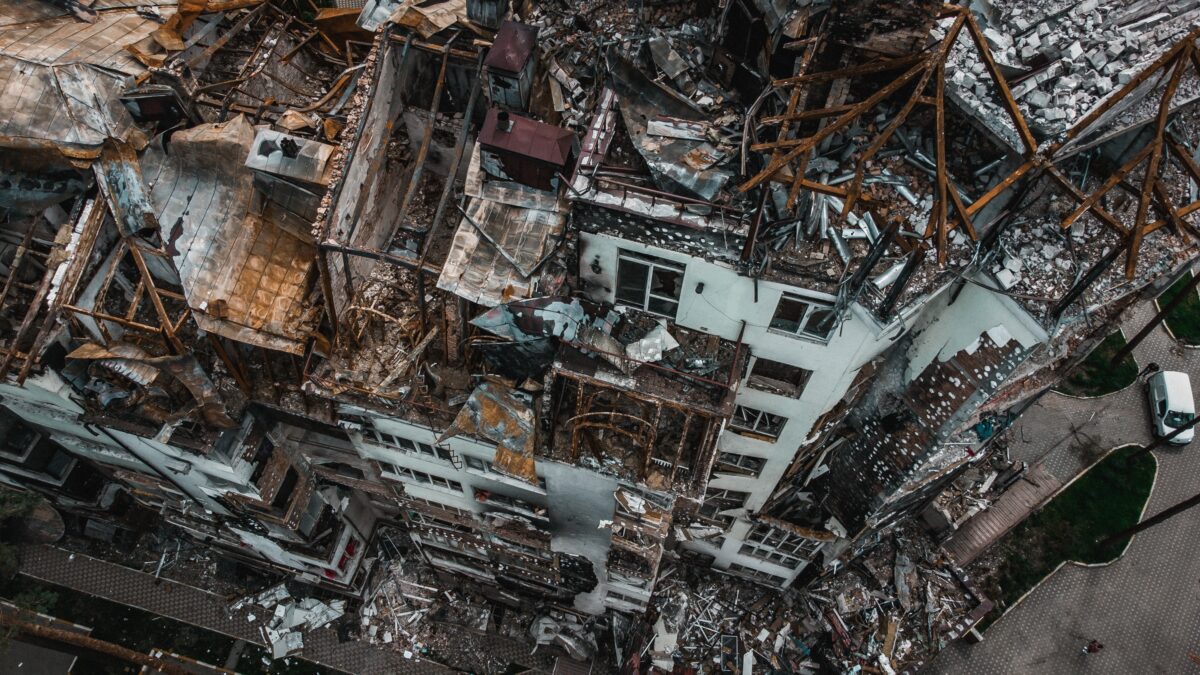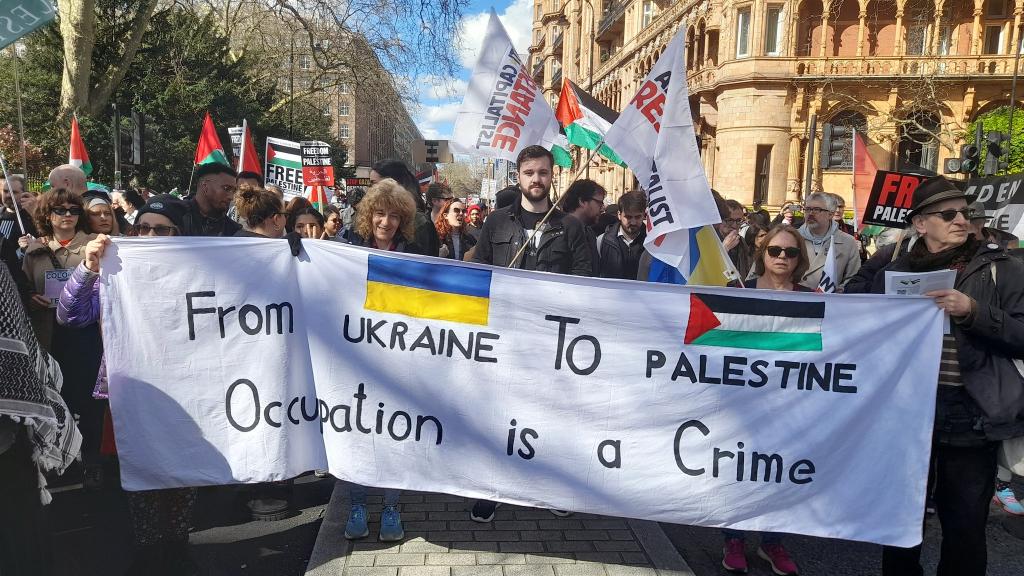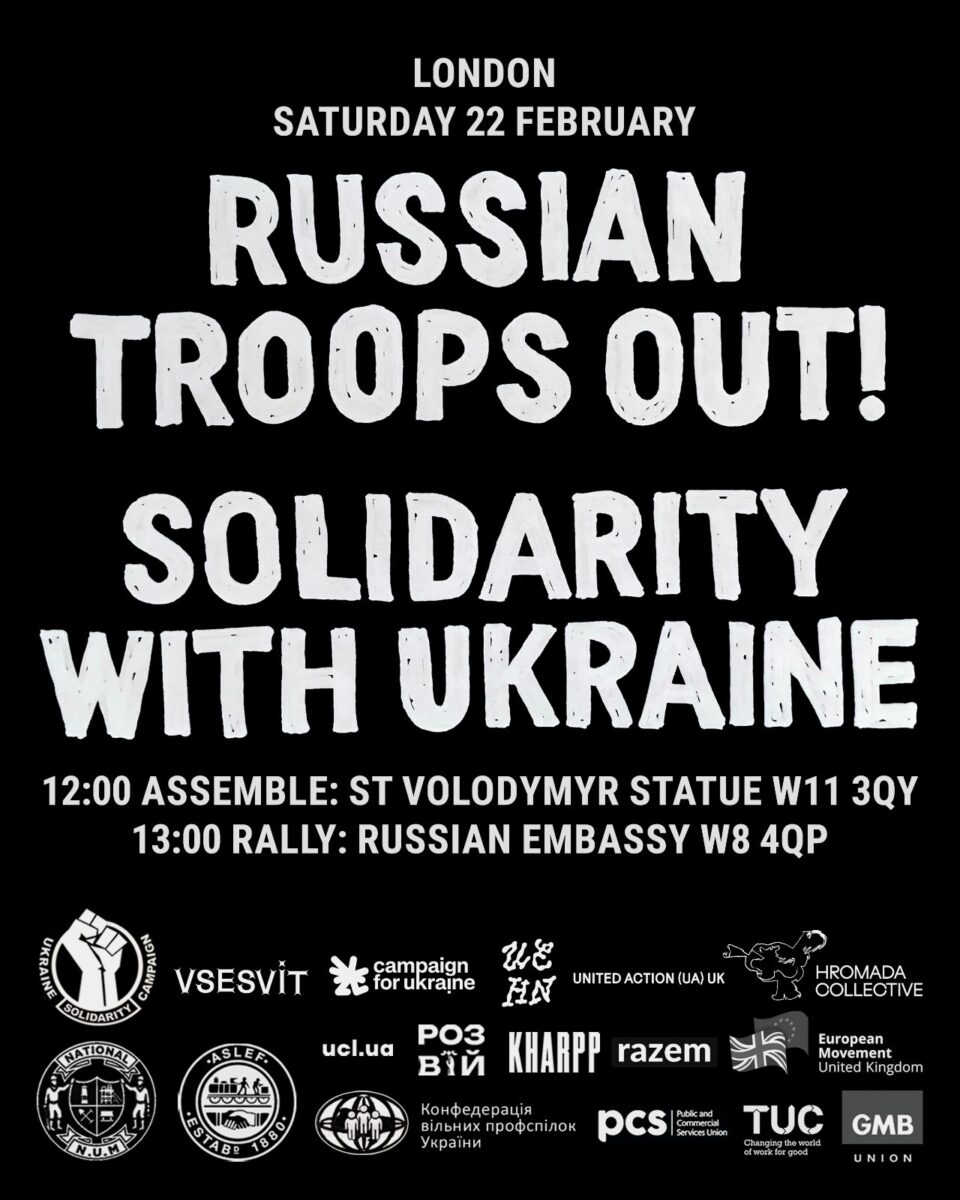The current phase of the war in Ukraine started on the 24 February 2022, three years ago. Russia invaded and annexed Crimea in 2014, and then attempted for eight years to annex the Donbass. When Putin ordered the large-scale imperialist invasion in February 2024 to “demilitarise” and “denazify” Ukraine, he believed that the Zelenskyy government would fall within a matter of days and that Russian troops would be welcomed. But the Russian troops were pushed back, and three years on, victory for Putin, or at least achieving his war aims, is nowhere near.
For the Ukrainians, their motivation to continue the war remains the same: the liberation of their country from occupation and restoring self-determination. Their resistance to imperialist aggression and for independence is entirely legitimate, as well as is obtaining the arms from wherever they can. Occupation and annexation are crimes, whether they happen in Ukraine or Palestine. Ukrainians voted decisively for independence in 1991 (at the time of the end of the Soviet Union) in the referendum, with 92% voting in favour, on an 84% turnout.
Casualties on both sides during the last three years have been extremely high. The Russians may have lost over 200,000 killed and 600,000 wounded, while Ukraine has lost over 80,000 dead and 400,000 wounded. In addition, over 12,000 Ukrainian civilians have died, with 30,000 wounded. Despite exhaustion from the war, 4 in 10 Ukrainians still want the war to continue until victory, while understandably, half want war to end as soon as possible. Ukraine is a nation with a long history, with its own language and culture. Like for Palestinians and other oppressed peoples, the sentiment for independence, national sovereignty and self-determination goes back a long way.
After three years of this phase of the war, Ukraine is in a difficult position. Russia has stepped up its bombing of civilian areas and infrastructure, and is making slow but steady military advances. Western sanctions against Russia have not hit its economy significantly, and its export of liquified natural gas is at a record high. However, there are strains now emerging in the Russian economy as a result of the war. After a period when the war actually seemed to be benefiting Russia economically (so-called ‘military Keynesianism’) it has now encountered serious resource constraints and increasing inflation. If significant economic problems arise in Russia, this would strengthen the Ukrainian position in any negotiations.

The financial pressure from Trump is dangerous for Ukraine. Biden, before leaving office, committed the US to $5.9 billion in military and budget aid, but Trump may renew this only as a loan if Ukraine agrees to negotiations with Russia in which it makes concessions. After pausing arms supplies for a few days, Trump has suggested aid may continue in exchange for Ukraine supplying the US with rare earth metals. Trump’s pause in USAid will also affect Ukraine hard: since February 2022, it has received $7.6bn in humanitarian aid from the US.
In Ukraine the war effort is being hit by war-weariness, more difficulty recruiting and the increase in desertions. But more critical is that the government has not instituted a “war economy” with decisive state intervention in critical sectors, from arms manufacture to health and housing. Instead, it has embraced neoliberalism with privatisations and attacks on employment rights. The latest attack on union and labour rights has been pushed back, but the threat remains. Zelensky wants to prove his neoliberal credentials, in particular with his refusal to call for the debt of Ukraine be cancelled. He wants to be a reliable partner with private investors and banks. Cancellation of the debt is crucial to enable a socially just reconstruction. Privatisations have enabled the enrichment of a few and spread corruption, which in turn has damaged morale and trust.
Putin clearly believes that Ukraine will be forced into accepting an imposed “peace” settlement negotiated with Trump behind the backs of the Ukrainians. In a sign that Putin cannot win the war for now, the original war objectives have been watered down. In addition to the annexation of the Donbass, Putin wants Ukraine to reduce its military by 80% and stay out of the EU and NATO. Despite Zelensky conceding negotiating directly with Putin, this has been rejected by Putin, who claims that Zelensky is not legitimate as his term expired and no new elections have been held during wartime. So the Ukrainians have little choice but to fight on and resist as best they can the Russian invasion, the purpose of which is to turn their country into a satellite of Russia.
The war has dragged on because Ukraine has not received weapons in sufficient quantity or quickly enough to defend itself. Western imperialism has always been ambivalent in its support for Ukraine. Some countries would like to see the war end as soon as possible so that “normal” business can resume with Russia, while others would like the war to drag on as long as possible so as weaken Russian imperialism. The West reluctantly supported Ukraine in the name of “defending democracy”. This had the benefit of giving NATO and Western imperialist countries a new coat of paint after their 20-year “war against terrorism” ended in defeat in Afghanistan and Iraq. Their lukewarm support for Ukraine is in stark contrast with their support for genocidal actions of Israel in Gaza and the brutal dictatorship of the House of Saud, providing both of them with an unlimited supply of weapons. Ukraine is of limited geostrategic interest to the West compared to Israel and Saudi Arabia.

Labour leader Keir Starmer has continued the Tory government’s cautious support for Ukraine, carefully avoiding supporting its war aims – the liberation of the country. He only says that Ukraine should be “in the strongest possible position in the coming months” so that any peace deal to end its war with Ukraine “could be achieved through strength”. While he declares that Britain is “standing by Ukraine”, he drags his feet supplying weapons, but recommits Britain to increased military spending. While supporting Ukraine, some on the left have latched on to NATO’s new mission in their belief that Russian imperialism is the gravest danger facing Western democracies, therefore backing Labour’s increases in military budgets. But the West can give Ukraine what it needs without increasing such spending.
The Ukrainians should be supported in their resistance against Russian imperialist invasion despite Zelensky’s neoliberal government. They should also be supported in spite of Western imperialism trying to influence the war aims and the future of Ukraine. The West is using the war to weaken a rival imperialist country, Russia, and ensure a neoliberal reconstruction. For the West, this is more important than the liberation of Ukraine. The neoliberal course of the Zelensky government has to be condemned, and illusions by Ukrainians in the European Union be dispelled. The “structural adjustment” applied by the EU and the European Central Bank on Greece in 2015 for a bail-out of its debt is a lesson for Ukraine. There was an alternative then, and there is an alternative now in Ukraine to extreme neoliberalism. It will come from the left, the trade unions and progressive forces in Ukraine, with international solidarity, fighting for a cancellation of the country’s debt and for a reconstruction based on social, economic and climate justice.
Internationally, supporters of Ukraine must continue solidarity work. This includes education about the oppression being suffered by Ukrainians in territory under Russian occupation. We must challenge any view that the sufferings of Ukrainians will end if they are forced to stop fighting and to surrender. Trump’s plans to allow Putin to annex around 20% of Ukraine will not provide the basis for a long-term settlement to the war. They may lay the basis for further invasion and annexation. In addition to demanding the withdrawal of Russian forces from Ukraine, we must raise demands for return of all Ukrainian prisoners of war and Ukrainian civilians who have been forcibly removed to Russian territory. We must oppose peace talks being held without Ukrainians present or any imposition of a settlement against the will of the Ukrainian people.

Saturday 22 February
Russian Troops Out! Solidarity with Ukraine!
Demonstration to mark the third year of the all-out invasion of Ukraine. Called by the Ukraine Solidarity Campaign and backed by 9 Ukrainian organisations in London, the TUC, PCS, GMB, NUM and UNISON. Assemble 12 noon at the statue of St Volodymyr statue (opposite Holland Park tube) for a short march to Russian Embassy.
Affiliate to the Ukraine Solidarity Campaign https://ukrainesolidaritycampaign.org/
To receive leaflets for the demonstration, contact info@ukrainesolidaritycampaign.org
For further reading
Order these from Resistance Books:
Making Sense of Russia’s invasion of Ukraine
The Russian Invasion and the Ukrainian Left
Internationalism or Russification
Ukraine: Voices of resistance and solidarity
Also sign up here for weekly newsletters from Ukraine Information group

